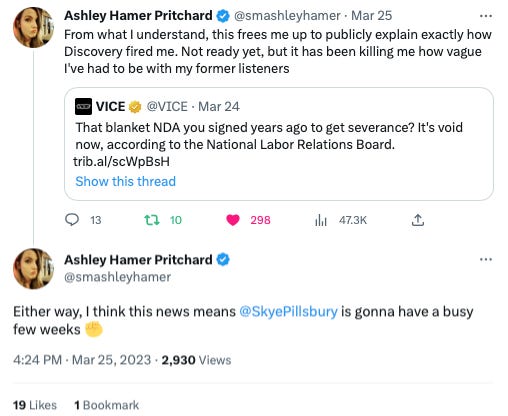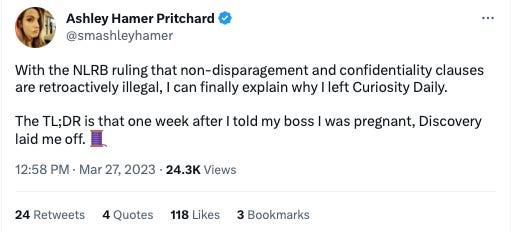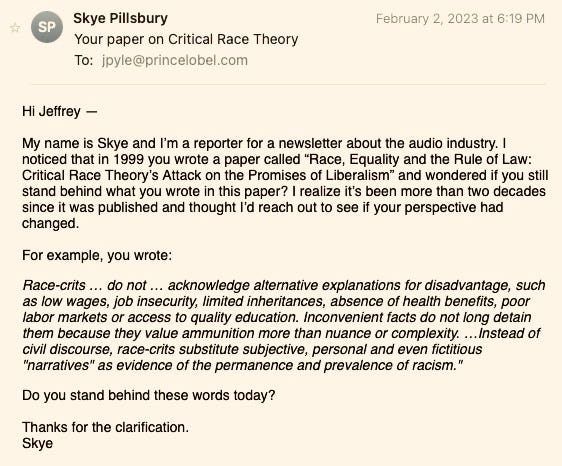What Happened to The Takeaway's Grant Money?
Plus: You Can Break That Confidentiality Clause Now
Hey Everyone!
After hitting send on last week’s issue, in which I asked readers to support my work with a paid subscription, I was in such a state of self-doubt that I spent the entire weekend obsessively streaming escapist TV shows — and of course listening to their respective companion podcasts — in an attempt to distract myself from whether anyone besides my parents would sign up (thanks, Mom and Dad). Now that I’ve finally removed my hands from my eyes and seen that readers far and wide clicked on the “upgrade to paid” button, I feel an overwhelming sense of gratitude. Thank you for investing in my work! And watch this space for details on members-only perks.
Here’s what’s on the docket today:
Your employment NDA may no longer be valid;
A reader prompts me to reveal an email I sent during my reporting for this piece on PRX’s law firm;
The Ms. Foundation issued a grant to WNYC’s The Takeaway, but host Melissa Harris-Perry says her team never saw a dollar. What happened?
Let’s hit it —
Your employment NDA may no longer be valid.
Thanks to Descript Managing Editor (and podcaster) Ashley Hamer Pritchard for bringing a recent ruling from the National Labor Relations Board to my attention:
According to that story in Vice,
…employers cannot include blanket non-disparagement clauses in their severance packages, nor demand laid-off employees keep secret the terms of their exit agreements. … the decision does, in fact, have '“retroactive application,” meaning that already-signed and “overly broad” non-disparagement clauses are no longer considered valid by the NLRB.
In a memo from the NLRB’s general counsel Jennifer Abruzzo, she clarified that “narrowly-tailored” confidentiality clauses that “restrict the dissemination of proprietary or trade secret information for a period of time based on legitimate business justifications may be considered lawful,” however these agreements can’t include “provisions that affect the rights of employees to engage with one another to improve their lot as employees.” That includes the right to communicate with “their union, judicial or administrative or legislative forums, the media or other third parties.” (That emphasis was mine, hello, I am the media.)
Regardless of how you feel about this news (I feel great), my hunch is that audio employees who have signed non-disclosure agreements might still hesitate to speak with me on the record, as the industry is still so small. (Many of my sources who are not muzzled by corporate paperwork still request anonymity.) However, if I’ve interviewed you off the record — or not at all — due to an agreement with your prior employer, and your level of comfort in speaking has changed as a result of this news, let’s talk! And regardless, spread the word about this to your colleagues, particularly those who are being laid off right now.
By the way, since posting that thread, Ashley has publicly explained her firing from Discovery. I bet it feels pretty damn good to unshackle yourself!
Next Up, An Exercise in Journalistic Transparency
A lively discussion has been developing in the comments section for my piece on Prince Lobel LLP, the law firm hired by PRX to investigate a former employee’s claims of racism. As part of that story, I mentioned that in 1999, Jeffrey J. Pyle, one of the five (all male, all white-presenting) partners in the firm’s “media, publishing and first amendment law” practice, had published a legal paper called “Race Equality and the Rule of Law: Critical Race Theory’s Attack on the Promises of Liberalism.”
In the comments section underneath that story, a reader asked me why I thought “it’s right to throw Jeffrey Pyle under the bus for something he wrote in 1999.” After explaining that I mentioned Pyle’s paper in the spirit of transparency and that I had also reached out to him for comment prior to publishing my story, the reader posed a second question: “Did you disclose that you would imply he has bias when you asked for comment? Maybe he finds the suggestion unfair and absurd and doesn't want to dignify it.”
In response to this, I’ve decided to publicly share the email I sent to Pyle. Did I infect this email with my own bias? You be the judge.
Since writing this letter, I’ve reached out to Pyle a second time (his email is prominently displayed on the Prince Lobel website) but still haven’t heard back.
What Happened to The Takeaway’s Grant Money?
A few weeks ago, I published a story about WNYC leadership’s decision to cancel its daily news show The Takeaway. The station blamed the decision on “declines in audience and station carriage,” “pre-existing financial deficits,” and “revenue headwinds.” According to my reporting, management had denied necessary support to the team for years, making it nearly impossible for the show to live up to the station’s various demands.
During my reporting for that piece, one source mentioned that the show’s well-connected host Melissa Harris-Perry, had invested her own time and leveraged her own relationships in an effort to raise funds for the show. The source mentioned that one of those grants had come from the Ms. Foundation in support of a series called “She-lection,” which tracked the recruitment, campaigns, and media coverage of midterm election races where women were competing against one other for office. However, according to the source, the team wasn’t able to make use of the funds because, to their knowledge, the money hadn’t been funneled toward the show.
When I fact-checked this with WNYC last month, a spokesperson responded via email that “The grant you're referring to was spent on The Takeaway.” As a result, I removed the claim from my story.
Then, a couple of weeks ago, I came across this tweet and wondered if my source’s claim had been correct.

I decided it was worth exploring whether or not The Takeaway had been able to make use of its own grant money, particularly as it was shut down, at least in part, due to financial concerns.
So last week, I reached out to Harris-Perry, to get the back story on the funds she secured from the foundation. As part of our email exchange, she shared the letter she referenced in the above tweet, and has agreed to let me share it with readers of The Squeeze. The letter was sent from Ms. Foundation’s Director of Innovative Grantmaking and Research Shawnda Chapman to New York Public Radio’s Institutional Giving Development Officer Luke Taylor. Here it is in full:
Good evening Luke,
My dearest apologies for the slow response. I want to take this opportunity to express my extreme displeasure and disappointment with hearing about the treatment and experiences of Melissa Harris Perry and her talented team at the Takeaway. The Ms. Foundation for women has as its core mission to build social, economic and political power in the lives of women girls. We have a deep commitment to supporting the leadership of Women of Color, who we know face tremendous structural issues in society and within organizations including racism, sexism, unequal resources and trust deficits. To be clear, funding for this project was made available from the Girls of Color Initiative singularly because of the expertise and leadership of Mrs. Harris-Perry and her team, her reputation and her deep authentic relationship with women and communities of color. I can say unequivocally that we do not support organizations that treat women of color leaders with disrespect and indignity.
That said, we look forward to receiving the final report for this grant as well as any materials about the coverage this grant supported.
Best,
Shawnda Chapman
Director of Innovative Grantmaking and Research.
Ms. Foundation for Women.
In an emailed reply, Taylor told Chapman that he had passed her message to NYPR leadership and would “look forward to sharing our report later this year.” After reading the letter, I asked Harris-Perry if she could provide additional context around how the grant was secured and what she had expected it to support.
Here’s what she wrote to me in an email:
I have a long relationship with the Ms Foundation going back nearly a decade. I was the sole source of securing the grant. I approached Shawnda, I created the proposal for the series- which was our She-lection series. And I was the person who stayed in contact with the foundation while the series aired.
It's worth noting that the series was also a collaboration with the Rutgers Center for Women and Politics (CAWP). I have a multi decade relationship with CAWP and this was our second project with them. With both series our goal was to solidify the relationship for ongoing projects, to create fundable projects, and to create social media amplification opportunities.
Shanta was almost solely responsible for booking, producing, and amplifying both series. She did so while serving as the SOLE senior producer on a show which previously had TWO senior producers. In other words Shanta was carrying significant additional work burden to make these series happen.
We received ZERO dollars from the Ms Foundation grant. ZERO. Not one dollar was made available to hire additional digital support, to secure additional assistance with booking, to offer a bonus to Shanta for her additional work, or to allow us to create any kind of event that could have amplified it. We received no institutional support. There were no promotional spots, no press release, Nothing.
Harris-Perry summarized the situation this way:
I personally secured a grant based solely on my relationship with the funder. An existing team member took on all the additional burden of the work. We received no resources and NO ONE in WNYC development EVER spoke with me, emailed me, slacked me, or in any way communicated anything about where the resources were allocated. The first time I learned the grant was even acknowledged was when Shawnda Chapman forwarded me the email from development sent to her after our cancellation.
In response to Harris-Perry’s claims, an NYPR spokesperson sent me the following statement: “All of the funding from the Ms. Foundation was used to support reporting and production on the Takeaway as intended and outlined by the terms of the grant.”
During my exchange with Harris-Perry, she mentioned a number of other ways in which she made meaningful attempts to reduce costs and increase revenue and capacity for the show. For example, she personally paid $750 per month for a small LGBTQ+ owned social media business to amplify all of digital and terrestrial content. In an effort to reach younger listeners, she secured a grant that allowed the team’s digital producer to travel to California to report on the Teen Vogue summit. She paid the cost of all of her own travel and expenses during on-location reporting. She did this, she told me, with the support of her team, but “never from WNYC leadership.”
Harris-Perry also told me that she had an additional “$250,000 in likely grants/ gifts lined up,” but given the lack of communication and follow-through from WNYC management, she developed concerns about bringing in additional funds. Here’s more:
I communicated ALL of this repeatedly and directly to Andrew Golis and Kenya Young, including during an in person "retreat" for Studios leadership. I said "I have the ability to raise significant additional resources, but no one will provide a clear answer about how these resources will be used to support the work of The Takeaway. Will there be a share agreement? What are the accountability measures? What are the rules for revenue sharing when a team raises their own funds?" I was told publicly, "we don't have mechanisms for that and Andrew would have to make the decisions one at a time." At that point I indicated to Andrew, Kenya, my EP at the time and others that I would cease any efforts to raise revenue until rules and standards were clearly communicated in writing.
Yesterday an NYPR spokesperson denied these claims, writing that “this is not an accurate account of either internal conversations or our policies, but beyond that it’s not appropriate for us to comment.”
Let’s imagine that what Harris-Perry said is true, and WNYC doesn’t have a mechanism for clearly allocating funds. First, that’s obviously problematic for a station that has cited financial issues as a contributing reason for ending The Takeaway. But second, if WNYC is placing grant money from the Ms. Foundation in some general financial repository (an account dedicated to the station’s operating expenses, for example), it explains why, aside from saying the funds went to The Takeaway, station spokespersons didn’t provide any further detail around how the funds were allocated. Given the circumstances, they could have claimed the grant supported any number of WNYC projects and not have been provably wrong.
Alternatively, if WNYC does have a system for tracking all of this, why weren’t the spokespersons at the station eager to tell me about how the grant from the Ms. Foundation supported the show? Neither spokesperson even went far enough to name the series the money was intended to support.
Of course, a certain portion of grants often do go towards overhead, but a sizable percentage of a grant earmarked for a specific project should be set aside for that specific project. So again, if we are to believe Harris-Perry, it begs the question: why didn’t anyone alert the team that the grant had come in and work with them to determine how it could best support the She-lection project? (And while we’re here, why did Harris-Perry have to find out that the grant had been acknowledged from the Ms. Foundation, and not WNYC leadership?)
From the outside, this lack of communication from station leadership seems unethical — or if we’re being generous, deeply disorganized. And taken one step further, what does all of this say about the organization as a whole? Is there a method to its madness? Is there a strategy behind every move? And if so, is it working?
That’s next time. Have a good weekend.
Skye
Postscript:
Please consider supporting my work with a paid subscription to The Squeeze…
And also, THIS:










I'm so sorry that current circumstances prevent me from upgrading to any paid subscriptions including Netflix, Hulu, Roxane Gay and other great writers such as yourself. As soon as that changes, you will be one of the first people on my list. :)
I'm reading this on my study break at 11pm in the law library, feeling relief, sort of. I almost pursued Prince Lobel for a summer clerkship. My prof was the one who told me to do my due diligence. I know there are other women turning to law school after the layoffs. Please use the advice I got. (A) Reach out to women former employees of firms who will clue you in to things that men won't. (B) Get connected through your affinity bar right away and stay active. But, (C) Before applying, google terms like "diversity"/"legal profession" and "women of color lawyers" and read the full reports. I'm doing this now and am terrified by how common the thinking and outcomes above are. I'm giving myself this summer's internship at a reputedly welcoming firm to decide if I should continue come Fall.